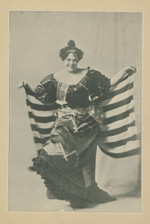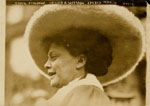The New York
Public Library for the Performing Arts > Vaudeville
Nation
Topical Vaudeville
 Promotional photograph of
Promotional photograph of
Marie Dressler in a patriotic
number from her vaudeville
act during the
Spanish-American
War

Trixie Friganza speaking
on suffrage, October 28, 1908
Vaudeville at War
It is said that the Spanish-American War (1898) was waged by
popular newspapers. It was also played out in vaudeville through
flag-waving acts by vocalists, such as Marie Dressler. Painted
glass song slides and the newly available Kinetoscope provided
photographic images of Commodore Dewey, the Rough Riders, and
battlegrounds. The United States debated entry into World War
I, through rival songs, such as "I Didn't Raise My Son to Be
a Soldier" and "I'm Proud I Raised my Son to be a Soldier." When
war was declared, Vaudeville performers were active fund-raisers
and troupe entertainers in Europe and the United States.
Topical Vaudeville
Songwriters and vaudeville comics reflected political concerns
of the 1919 season – Suffrage, Prohibition, and the popularity
of evangelist Billy Sunday's revival meetings. Most Suffrage
parody songs followed the tradition of "Becky" songs about immigrant
women becoming overly Americanized. The Tin Pan Alley songwriters
could not resist constructing puns with the evangelist's name
and New York's notorious Blue laws that banned Sunday performances.
Prohibition was a major concern of vaudeville, Broadway and
the audience. Comics were against Prohibition, but realized
that the audience, obsessed with evading the laws, appreciated
puns and references for every individual clause of the amendment. Bert
Williams made two such songs popular -- "The Moon Shines
on the Moonshine" and "Everybody wants a Key to My Cellar," alluding
to illegal stills and the grandfather clause that allowed personal
stashes of wine. Eddie Cantor, in his young man about town persona,
saw the positive side of Prohibition -- "You Don't Need
the Wine to have a Wonderful Time when they still make those
Beautiful Girls."